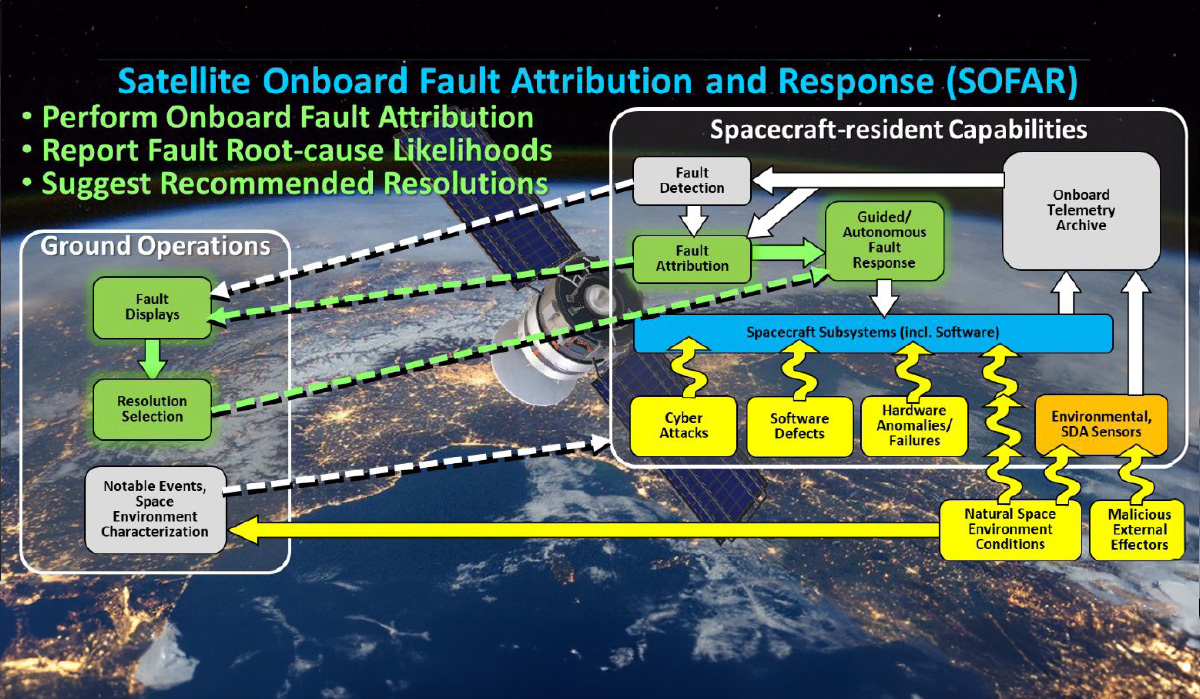Orbit Logic (Auria) and MIT Researching Onboard Fault Attribution Solution for Satellite Systems

Orbit Logic (now Auria) has been awarded a Phase I Small Business Technology Transfer (STTR) contract sponsored by the Air Force Research Laboratory to develop the Satellite Onboard Fault Attribution and Response (SOFAR) solution. The Space Telecommunications, Astronomy and Radiation (STAR) Laboratory in the Department of Aeronautics and Astronautics at the Massachusetts Institute of Technology is our research collaborator.
SOFAR will attribute faults encountered in satellite systems to their possible causes. In many cases, clues embedded in telemetry data may be so sparse that no single explanation is possible to determine. In these situations, SOFAR will develop multiple hypotheses and the relative likelihood of each. These hypotheses can be delivered to the ground operations center to inform the operators and can also be used by Orbit Logic’s onboard Autonomous Planning System (APS) to trigger/determine automated responses to mitigate the fault.
SOFAR will consume data from the hosting satellite bus, its sensors/payloads, and even remote sensors or platforms. Novel approaches developed by MIT will not just isolate the fault, but also attempt to identify its causation category, which can include: Space weather events; Application of physical or energetic effects to the platform; Failures, anomalies or degradation of the spacecraft’s hardware systems; Defects in the flight software that may emerge at unpredictable times or under unique conditions; or Cyber-attacks.
APS is a powerful technology that can be leveraged for autonomous planning in any domain. The breadth of its applications proves its flexibility; in addition to its use on this program for satellite fault management, Orbit Logic has utilized APS for the autonomous operation of heterogeneous constellations of Low Earth Orbit (LEO) satellites with DARPA and AFRL, heterogeneous teams of unmanned underwater/surface/aerial vehicles (UUVs/USVs/UAVs) with the Navy, heterogeneous swarms of rovers, satellites, and atmospheric vehicles for robotic Mars exploration, heterogeneous robotic swarms with astronauts-in-the-loop for Lunar exploration and mission-adaptive formation flying control of satellite clusters, with NASA.
Approved for public release; Distribution is unlimited. Public Affairs approval #AFRL-2023-0993
Learn more at Auria.space and follow us on LinkedIn to keep up with the latest developments and join the conversation.
About Auria
Auria advances complex space, missile, and cyber operations with visionary solutions and software that ensure smooth and precise execution. Our success is built on the excellence of diverse teams advancing innovative systems and operational software to strengthen our nation’s superiority in space. With a distinguished track record and a spirit of relentless pursuit, we set the pace for progress and execute every mission with the utmost precision. Headquartered in Colorado Springs, CO, with operations in Boulder, CO, Washington, DC, Albuquerque, NM, Huntsville, AL, Ogden, UT, and San Diego, CA, Auria deploys advanced AI and technologies that help secure our nation and increase knowledge of our planet. For more information, visit Auria.Space.